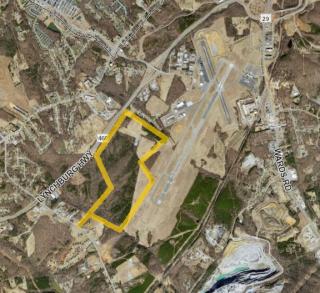Airport Commerce Park Regional Development Approved for $190,000 GO Virginia Grant
Three Grants from Region 2 Receive Approval
Posted on: December 15, 2022 - 9:45am

On December 13, 2022, the GO Virginia State Board announced its approval of three new Region 2 projects aimed at growing the regional economy. Region 2 consists of the cities of Covington, Lynchburg, Radford, Roanoke, and Salem; and the counties of Alleghany, Amherst, Appomattox, Bedford, Botetourt, Campbell, Craig, Floyd, Franklin, Giles, Montgomery, Pulaski, and Roanoke.
Board Approved Projects:
Airport Commerce Park Regional Development (City of Lynchburg/Campbell County/Lynchburg Regional Airport)
The Airport Commerce Park Regional Development will advance the Airport Commerce Park site from a Virginia Business Ready Sites Program characterization of Tier 2 to Tier 3 to strengthen competitive position in the global marketplace and attract advanced manufacturing, technology and life sciences with a potential focus on aerospace. The project is a collaboration between the City of Lynchburg, Campbell County, and Lynchburg Regional Airport. The GO Virginia board approved a total of $190,000 in state funds for the project, which is leveraging $158,074 in non-state sources.
"For a large development like we could see at the Airport Commerce Park, you have to do a fair amount of research on what is the lay of the land right now, how long would it take you to have infrastructure there, what is the best points of access," said Campbell County Directory of Economic Development, Nina Rezai, "so it really involves all of the things and all of the agencies who provide all of those different facets of a development."
“Site development is critical for the City of Lynchburg, and this funding will help develop a site that is in a great location for industrial growth,” said Marjette Upshur, director of the City of Lynchburg’s Office of Economic Development & Tourism. “The site is road, rail, and air accessible and will positively position Lynchburg and Campbell County for a number of opportunities for mix business, industrial and aeronautical uses.”
Botetourt Technical Education Center – Expanding Welding Training Capacity & Jobs in the Roanoke Valley (Botetourt County Economic Development Authority)
The Botetourt Technical Education Center (BTEC) will enhance the region’s capacity to train and prepare welders. The GO Virginia funding would help support the installation of ten new welding booths at BTEC’s campus in Fincastle. This expansion is projected to deliver forty-five new welders to the regional workforce over the initial three-year project term. The GO Virginia board approved a total of $166,667 in state funds for the project, which is leveraging $83,333 in non-state sources.
“The welding program at Botetourt Technical Education Center is one of the very few high school level welding programs in the United States to be certified by the American Welding Society,” said Ken McFadyen, director of economic development for Botetourt County. “This funding will allow us to expand the facility's capacity to train more students in welding skills, who will go on to become credentialed and gain employment in the region, helping to keep talent local.”
Industry 4.0 for the Automated-Connected-Electrified (ACE) Workforce (Virginia Tech College of Engineering)
Industry 4.0 will advance the region’s transportation and autonomous vehicles sector by providing direct technical assistance and advising to sector companies and enhancing and implementing the Industry 4.0 Curriculum that was developed through a prior Virginia Tech-led GO Virginia ECB grant. A U.S. Economic Development Administration Phase 1 award helped establish the ACE Coalition, which is composed of over 150+ public, private, and non-profit organizations. Though the Phase II funding was not awarded, the Coalition desires to proceed with initiatives to facilitate asset alignment, create plans to assist in firm growth, build a shared identity for the cluster, and develop a diverse and technically ready workforce. The GO Virginia board approved a total of $500,000 in state funds for the project, which is leveraging $251,300 in non-state sources.
“Through the Industry 4.0 curriculum, we’re teaching students using real-world transportation and air mobility problems,” said Pam VandeVord, associate dean of research and innovation for Virginia Tech’s College of Engineering. “Our goal is to align the resources within Region 2 to help companies find success and talent, as well as attract business to the area. In the process, we will elevate the transportation and autonomy sector, which has been identified as a priority sector in Region 2’s Growth and Diversification Plan.”
GO Virginia is a statewide initiative designed to encourage Virginia’s economic growth through the creation of high-wage jobs. Virginia Tech’s Center for Economic and Community Engagement serves as Region 2’s support organization.

